Tuk-Tuks EV Market - 2031:
The global electric tuk-tuks market was valued at $461.1 million in 2021, and is projected to reach $843.5 million by 2031, growing at a CAGR of 6.2% from 2022 to 2031.
Electric tuk-tuks (also known as e-rickshaws or toto) are small vehicles with three wheels that use electric power from batteries to run. They use an electric motor as an engine that draws electric power from the rechargeable batteries installed in the rickshaw body. These battery-operated vehicles are perfect for small distant transport, both cargo and people. Also, they are perfect for running on narrow streets because of their small size. Electric tuk-tuks are now one of the preferred modes of transport on streets because of their low maintenance cost, low fuel cost, eco-friendly, no noise pollution, and easy driving.
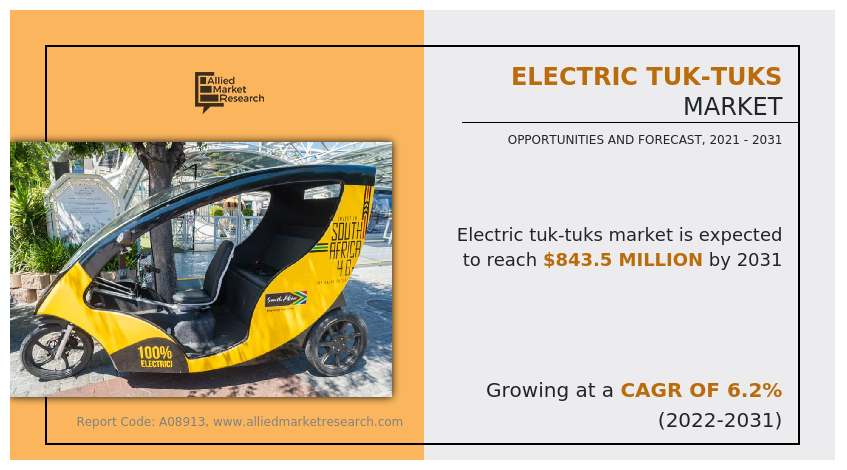
Furthermore, the increase in fuel prices at the international level, growth in pollution, and traffic congestion, especially in urban areas, have further increased the acceptance of electric three-wheelers, including electric tuk-tuks, across the globe. For instance, in June 2022, Saera Electric Auto Pt. Ltd. expanded its production capacity by commencing operations at its manufacturing plant in Bawal, Haryana. The plant was spread across an area of 20,000 sq.m and was equipped with advanced engineering tools and equipment for manufacturing electric vehicles, which favored the growth of electric tuk-tuks in the Indian market.
The factors such as growth in the trend of shared mobility, inclination toward the use of electric tuk-tuks as an eco-friendly & efficient solution for commute, and stringent vehicular emission norms & regulations supplement the growth of the electric tuk-tuks industry. However, the lack of standardization of EV charging and the high cost of battery are the factors expected to hamper the growth of the market. In addition, greater availability of credit and financing options and rising fuel prices and new product launches create market opportunities for the key players operating in the electric tuk-tuks market.
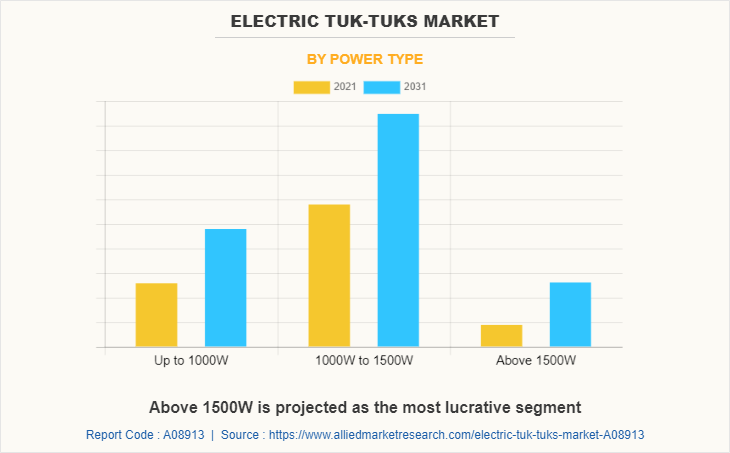
The electric tuk-tuks market is segmented into power type, battery type, range and price range and region. By power type, the market is divided into up to 1000W, 1000W to 1500W, and above 1500W. By battery type, it is fragmented into lithium-ion and lead acid. By range, it is categorized into upto 50KM and more than 50KM. By price range, it is further classified into low to mid and high. By region, it is analyzed across North America, Europe, Asia-Pacific, and LAMEA.
The leading players operating in the electric tuk-tuks market are Arna Electric Auto Private Limited, Bajaj Auto Ltd., E-Tuk Factory, Goenka Electric Motor Vehicles Pvt. Ltd., Green Valley Motors, Hero Electric, Jezza Motors, Kinetic Green Vehicles, KUKU Automotives, Mahindra Electric Mobility Limited, SAERA ELECTRIC AUTO PVT. LTD., SN Solar Energy, Speego Vehicles Co Pvt Limited, SUPERECO, Udaan E Rickshaw, QSD, and Zuperia Auto Pvt. Ltd.
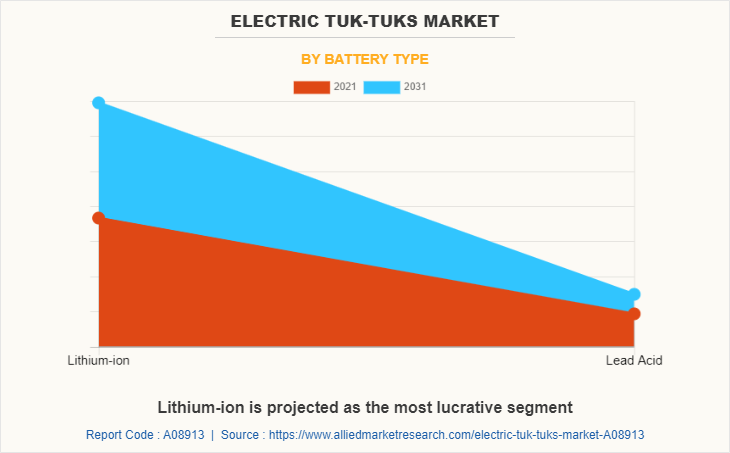
Growth in the trend of shared mobility
Shared mobility services reduce city congestion and decrease overall vehicle emissions. Therefore, digitally enabled car sharing and ride-hailing manage travel needs in the smartest way and also provide a hassle-free and environmentally sound alternative to private car ownership. This sharing & ride-hailing activity which includes the entire process from travel planning to payments can be handled by a single mobile app. In the coming years, ride-hailing services are projected to play a major role in this space by reducing manual tasks and minimizing the overall time & cost. This trend is further foreseen to strengthen the growth of the electric tuk-tuk market.
To create awareness and promote new services, the key players offer discounts, free rides, and coupon facilities to customers. Moreover, California-based company Lyft Inc. is providing free rides to patients. Furthermore, Lyft also invested in several partnerships, most noticeably in healthcare transportation, which provides new mobility options for non-drivers, including older people, younger people, people with disabilities, and people without access to a vehicle. Shared transportation is taking a back seat amid the pandemic. However, the benefits of shared mobility, such as reduced congestion, reduced emission, and low cost, are anticipated to strengthen the demand for electric tuk-tuks during the forecast period.
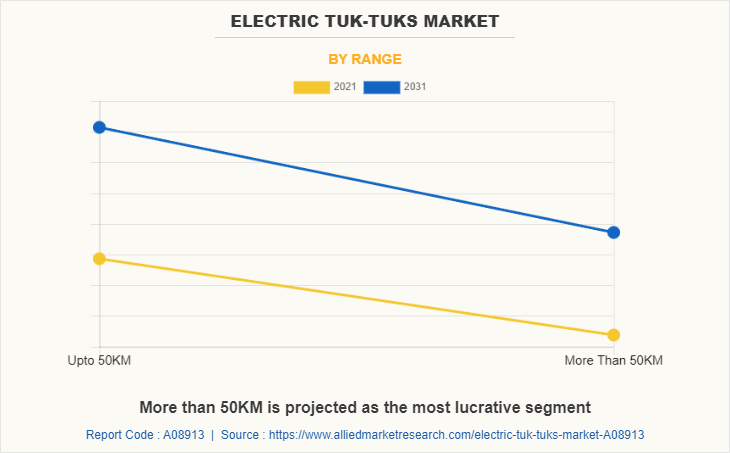
Inclination toward the use of electric tuk-tuks as an eco-friendly & efficient solution for commute
Continuously growing global carbon emission by combustion of fuel has been one of the foremost concerns for governments and environmentalists for the past few years, which as result, bolsters the demand for electric tuk-tuks across the globe for passenger transport; thereby supplementing the growth of the market. Furthermore, the increase in fuel prices at the international level, growth in pollution, and traffic congestion, especially in urban areas, have further increased the acceptance of electric three-wheelers, including electric tuk-tuks, across the globe. For instance, in June 2022, Saera Electric Auto Pt. Ltd. expanded its production capacity by commencing operations at its manufacturing plant in Bawal, Haryana. The plant was spread across an area of 20,000 sq.m and was equipped with advanced engineering tools and equipment for manufacturing electric vehicles, which favored the growth of electric tuk-tuks in the Indian market. In addition, relatively higher running and maintenance costs of petrol/ CNG & diesel propelled three-wheeler leads to a shift in preference for electric three-wheeler for the shorter transits, which, in turn, drive the electric tuk-tuks market growth.
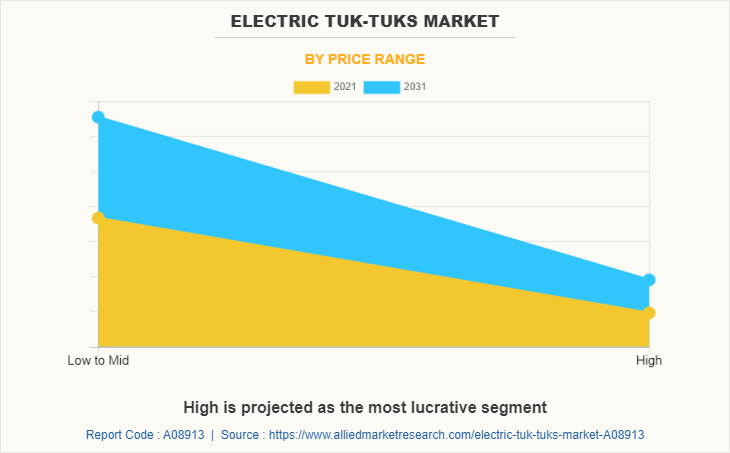
Lack of standardization of EV charging
The electric vehicle’s battery source does not have any alternative source for charging. The shortage of charging points in most cities is a major challenging factor for the growth of the global electric tuk-tuks market. Furthermore, thin & inconsistent infrastructure and range anxiety can create a problem for electric vehicles and can put travelers at risk. Moreover, the implementation of the supportive infrastructure required for electric vehicles in developing countries is less. Furthermore, as the technology is not mature enough, apart from China, the sales of electric vehicles are extremely less compared to the internal combustion engine (ICE) vehicle sales. The automotive industry has standardized 120- and 240-volt plugs, which are primarily used in homes but has not yet set a standard on the plugs or ports that can charge vehicles in 30 minutes or less. Thus, all these factors, coupled with the different prices at charging stations altogether, are responsible for hindering the growth of the global electric tuk-tuks industry.
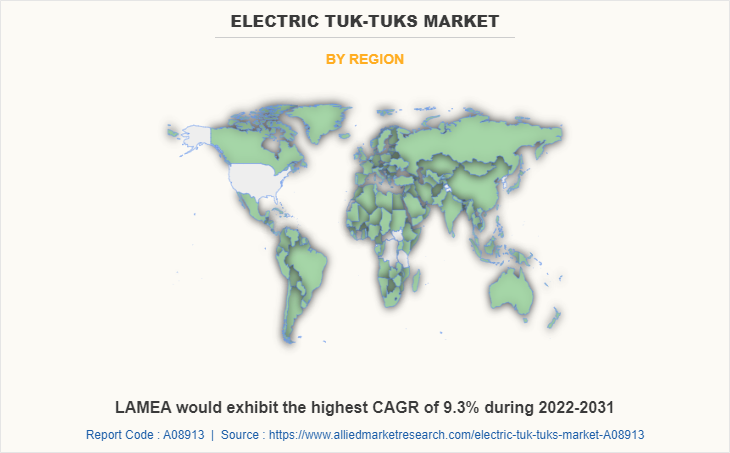
Greater availability of credit and financing options
Governments of various countries are supporting the adoption of electric tuk-tuks, an efficient solution for daily commutes for passengers, by introducing various incentive plans in terms of tax credits and incentives. For instance, in June 2019, the Indian Government announced a plan to lower the goods & service tax (GST) on electric vehicles from 12% to 5% to reinforce the adoption rate of electric three-wheeler (loader rickshaws/electric tuk-tuks). The government is even waiving the registration fees and road tax under the EV policy. The subsidies further bring down the overall cost of ownership, which allows the owner to save a significant amount of capital annually. All these factors are expected to create lucrative opportunities for the electric tuk-tuks market.
Key Benefits For Stakeholders
- This study presents an analytical depiction of the global electric tuk-tuks market analysis along with current trends and future estimations to depict imminent investment pockets.
- The overall electric tuk-tuks market opportunity is determined by understanding profitable trends to gain a stronger foothold.
- The report presents information related to the key drivers, restraints, and opportunities of the global electric tuk-tuks market with detailed impact analysis.
- The current electric tuk-tuks market is quantitatively analyzed from 2022 to 2031 to benchmark the financial competency.
- Porter’s five forces analysis illustrates the potency of the buyers and suppliers in the industry.
Electric Tuk-tuks Market Report Highlights
| Aspects | Details |
| Market Size By 2031 | USD 843.5 million |
| Growth Rate | CAGR of 6.2% |
| Forecast period | 2021 - 2031 |
| Report Pages | 251 |
| By Power Type |
|
| By Battery Type |
|
| By Range |
|
| By Price Range |
|
| By Region |
|
| Key Market Players | Mini Metro EV LLP, Gayatri Electric Vehicles, Goenka Electric Motor Vehicles Private Limited, BABA E-Rickshaw, AG International Pvt. Ltd., Singham (U.P. Telelinks Limited), Mahindra Electric Mobility Limited, Hongsengmeng Group Co., Ltd., SN Solar Energy, J.S. Auto Pvt. Ltd., E-TUK Factory, Zuperia Auto Pvt. Ltd., Victory Electric Vehicles International Limited, Arna Electric Auto Private Limited, Kinetic Green Vehicles, Adapt Motors, Terra Motors India |
Analyst Review
This section provides the opinions of various top-level CXOs in the global electric tuk-tuks market. The market is supplemented by numerous developments carried out by the top electric tuk-tuks manufacturers, which has led to the market’s growth. Moreover, technological advancements in vehicles, followed by the need for smart vehicles to commute within cities, supplement the growth of the global tuk-tuks market. For instance, in December 2021, Mahindra Electric Mobility Limited launched the new Treo electric 3-wheeler rickshaw in Maharashtra, India. The vehicle was available at a starting price of $2,600 (2.09 lacs) and was driven by an 8kW motor which allowed it to have top riding speeds of up to 55kms.
Furthermore, governments of various countries are supporting the adoption of electric tuk-tuks, an efficient solution for daily commutes for passengers, by introducing various incentive plans in terms of tax credits and incentives. For instance, in June 2019, the Indian Government announced a plan to lower the goods & service tax (GST) on electric vehicles from 12% to 5% to reinforce the adoption rate of electric three-wheeler (loader rickshaws/electric tuk-tuks). The government is even waiving the registration fees and road tax under the EV policy. Furthermore, growing global carbon emissions by combustion of fuel have been one of the foremost concerns for governments and environmentalists for the past few years, which as result, bolsters the demand for electric tuk-tuks across the globe for passenger transport; thereby supplementing the growth of the market. For instance, in Maharashtra (India), the state’s new electric vehicle (EV) policy aims to have a 10% share of electric vehicles among total vehicle registrations by 2025 to reduce vehicular emissions, as stated by the Director of Maharashtra Pollution Control Board (MPCB).
The market growth is supplemented by factors such as growth in the trend of shared mobility, inclination toward the use of electric tuk-tuks as an eco-friendly & efficient solution for commute, and stringent vehicular emission norms & regulations supplement the growth of the electric tuk-tuks market. However, the lack of standardization of EV charging and the high cost of battery are the factors expected to hamper the growth of the electric tuk-tuks market. In addition, greater availability of credit and financing options and rising fuel prices and new product launches create market opportunities for the key players operating in the electric tuk-tuks market.
Among the analyzed regions, Asia-Pacific is the highest revenue contributor, followed by Europe, LAMEA, and North America. On the basis of forecast analysis, LAMEA is expected to lead during the forecast period due to the rising level of emission and supportive government schemes for electric tuk-tuks (e-rickshaws), and growth in the adoption of electric tuk-tuks for ridesharing.
The global electric tuk-tuks market was valued at $461.1 million in 2021, and is projected to reach $843.4 million by 2031, registering a CAGR of 6.2% from 2022 to 2031
The leading players operating in the electric tuk-tuks market are Arna Electric Auto Private Limited, Bajaj Auto Ltd., E-Tuk Factory, Goenka Electric Motor Vehicles Pvt. Ltd., Green Valley Motors, Hero Electric, Jezza Motors, Kinetic Green Vehicles, KUKU Automotives, Mahindra Electric Mobility Limited, SAERA ELECTRIC AUTO PVT. LTD., SN Solar Energy, Speego Vehicles Co Pvt Limited, SUPERECO, Udaan E Rickshaw, QSD, and Zuperia Auto Pvt. Ltd.
LAMEA is the largest regional market for electric tuk-tuks.
Introduction of Lithium-Ion batteries are the upcoming trends of electric tuk-tuks market in the world
Increased usage in passenger transportation are the leading application of electric tuk-tuks market
Loading Table Of Content...


